#she presented her total lack of interest in what actually happened in that conversation as a fault on their part for not being indie enough
Explore tagged Tumblr posts
Text
The assertion that 'if you take away 40 pages the story should be incomprehensible' is the exact same mentality that says watching a CinemaSins video or a wikipedia summary is the same as watching the movie itself, just presented backwards. It's such astonishingly bad writing advice I'm a little bit flabbergasted, and this is ABSOLUTELY NOT WHAT PACING IS I'M CRY-LAUGHING. For most of the thread she's talking about structure (when she's not just talking about general craftsmanship/prose), which yes goes hand in hand with pacing but isn't one and the same. Structure is the materials to build the house, pacing is where you place them.
Sweet bejeezus, if your approach to scene-building doesn't even take into account the possibility that mundane details can be used to build understanding through subtext, that is alarming. It approaches writing in the most painfully literal, surface level fashion. Their critique isn't that the dynamic between sisters was shallow, nor that the intended purpose (obviously the purpose of a scene like this is to demonstrate the relationship between sisters and establish the 'normal' of the protagonist's life) was inefficient. If it was meant to make that complaint, it was spoiled by the bad faith posturing that doesn't acknowledge the things that obviously were demonstrated/learned. Instead her complaint is 'where's the MAN??' and 'you should only spend time establishing your characters and building up their internal landscape and platonic relationships if they are super unique.'
'Pacing' is a number of things, but the most obvious is building and releasing tension, allowing plot beats and emotional movements to build, to crest and to sink in. In that sense I agree with the very first tweet. But 'establishing normal' is by and large incredibly important - it takes a very talented writer to jump in after a shakeup and inciting event and still give the reader an emotionally prevalent sense of the baseline that has been disturbed - and the surface level critique of 'why did you tell us she has a good relationship with her sister and makes time to hang out with her in the city where they live???' is crude and flimsy. Starting with scene setting is good pacing. Fleshing out your character's relationships and emotional dynamics outside of the main couple is valuable. (Although I'm guessing this person writes exactly the type of book I've DNF'd many times over the female lead being a hollow prop.)
Scenes should build upon themselves and each other. I 100% agree that every scene, even a workmanlike scene moving the plot forward, is an opportunity to suggest and flesh out other details. IMO you should always try to do so, and it's a critically underused level of nuance/craft in modern markets that undervalue writing craft even when ostensibly revolving around it. But the idea that if a scene is purely devoted to fleshing out and illuminating the characters it should be cut until you can stick more plot in it is....imprudent IMO. (Not always untrue.) This thread is aggressively promoting the McDonald's/MCU factory pump style of writing, and overall pushing the flat and reductive approach that it briefly pretends it's objecting too.
ETA: I really just cannot stress enough that if missing 40 pages very early in the book makes your story completely incomprehensible (depending on the reader) you have done a bad fucking job. Frankly, almost always it's a case where anything you establish early should continue to be underlined, reinforced and expanded upon if it's important!!
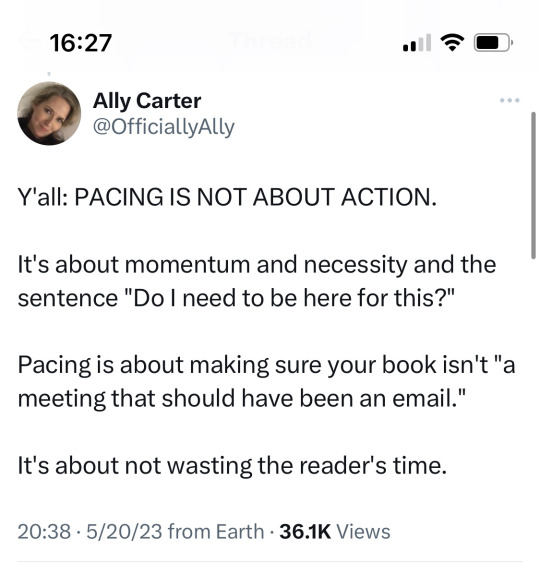
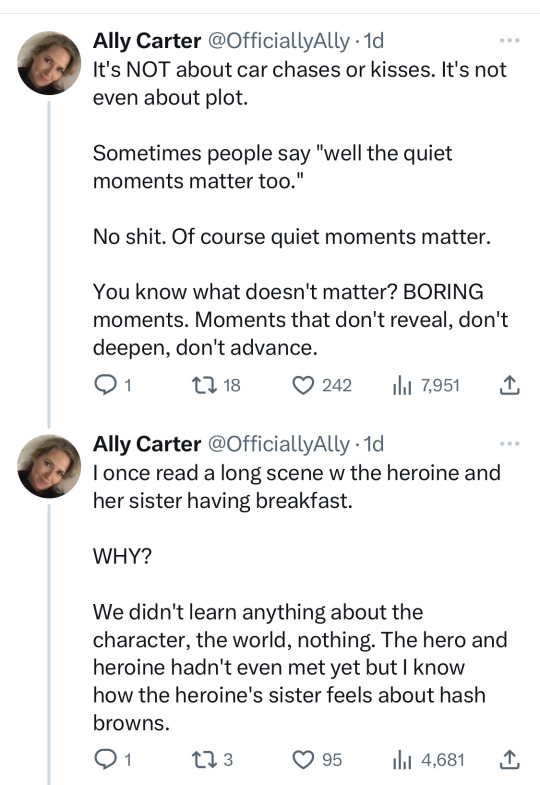
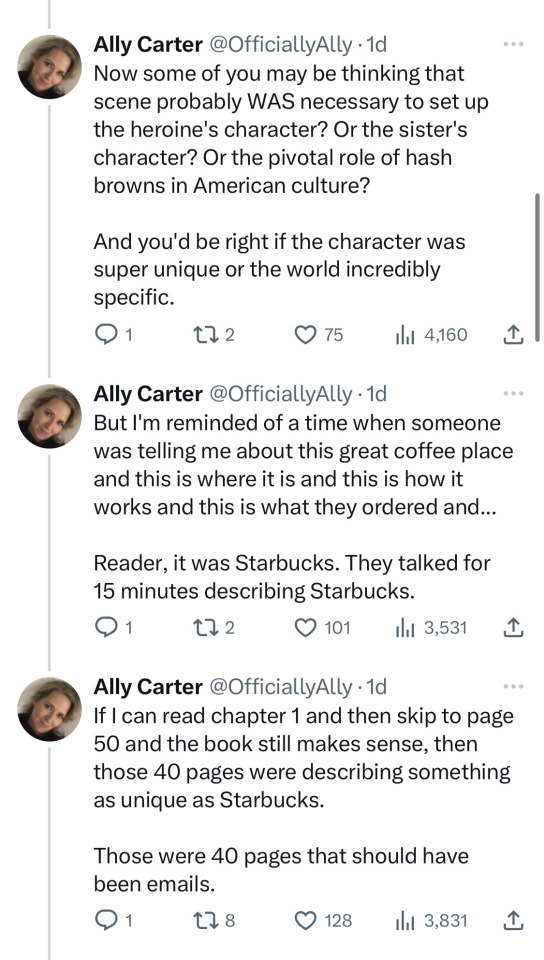
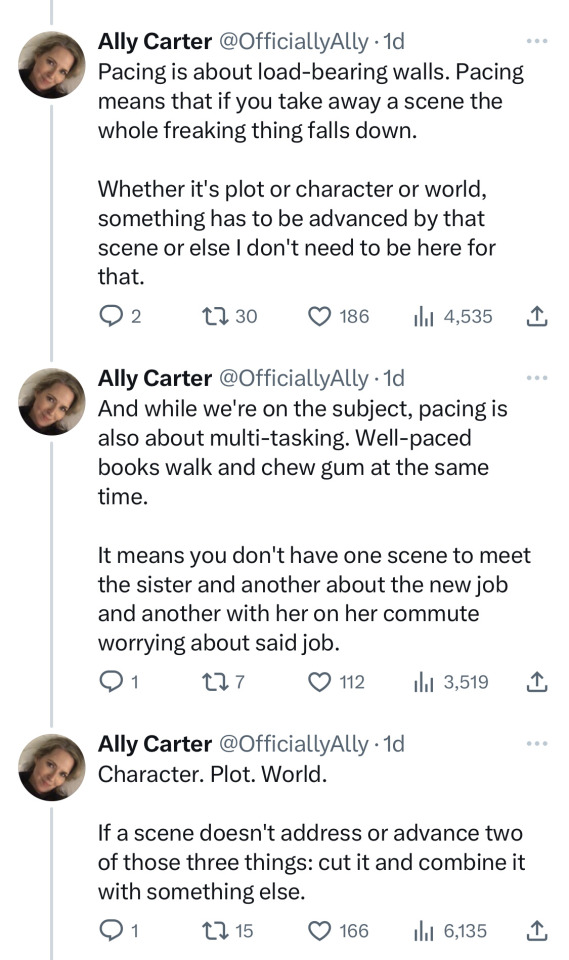
PACING IS ABOUT LOAD BEARING WALLS.
*staples violently to my own forehead*
#writing talk#the starbucks story is honestly fascinating to me because of how totally oblivious she seems and everything it suggests#was the person nervously talking to fill silence and sharing their favorite drink etc? were they somehow#genuinely unfamiliar with starbucks previously and how did that come about?#and how does this woman not comprehend that real life conversations do not get paced like a book?#and does she comprehend that this single sample reveals how completely surface level#her engagement is on every single field?#she presented her total lack of interest in what actually happened in that conversation as a fault on their part for not being indie enough
31K notes
·
View notes
Text
@faerunsbest As promised, my headcanons for Tilses and Zevlor:
Tilses is one of those people who has always known what she wants to be when she grows up. She joins the Hellrider equivalent of the cadets as soon as she’s of age (I think that would be 16, but maybe it would even be younger, like 14?) and is the most hardworking out of all her peers. Like I imagine young Zevlor was, she has a strong sense of justice and a lot of faith that if she puts in the work and is ‘good enough’, then she’ll be able to help bring a good name to her tiefling people.
She’s a strong warrior but lacks refinement in her skill (obviously, she’s only young), and yet graduated from cadets top of her class. For that reason I think she’d immediately start working relatively close to Zevlor, maybe placed in one of his elite soldier’s care as a sort of apprentice kind of thing- so she quickly gets access to the inner circle of the Hellriders. The inner circle however, is full of older soldiers who grew up together, and is a far cry from the younger soldiers that she had just been training with a few months prior. She feels totally out of place and a little overwhelmed, and while her mentor tries to be kind to her… yeah.
That’s where our dear commander comes in! He immediately takes an interest in Tilly, because he sees his younger self in her and both admires that, and wants to protect the hope and ideals he knows she has. So. When he sees her sitting alone one evening, he just… wanders over and comes to sit with her. She’s very surprised, and kind of intimidated- because this is the commander of the Hellriders for Gods sake- the man whom she and the other cadets looked up to while they trained. (HC that at this point Zevlor has been a commander for near a decade). But then they just talk, and the conversation flows. She feels comfortable with him! For the first time, she starts to feel like a proper Hellrider.
The next time the inner circle are hanging out, she actually comes to sit with them— and beats them all at cards. (Whether or not they let her win is up for debate). Zevlor is so proud (affectionate dad!)
I think Zevlor probably, like many of the other Hellriders, only took temporary lovers and didn’t settle down. Being a Hellrider is for life, is the phrase commonly tossed around, which makes me think soldiers usually completely commit to their careers and have little time for anything else. Now he’s older though, he’s starting to wish he had a family of his own… so he comes to feel paternally towards Tilly very quickly because of that. Of course, she’s not his kid and he knows that, she’s his subordinate soldier and he forces himself to remember that and not soften his orders- but when they’re not on duty he’s noticeably sweeter with her than the others.
Then Avernus happens. The elite soldier originally responsible for overseeing Tilses as a new soldier is killed, leaving her floundering a bit— and so (unofficially) Zevlor takes over that role as her mentor. Because they’re in constant danger in the hells Tilly and another of the elites also take up the role as Zevlor’s body guards while he’s frantically trying to manage their forces in the face of more devils and imps than he ever thought any of them would ever face in their entire lifetimes. Their friendship deepens as a result, and they frequently fight by one another’s side, so they’re very in sync as well. Tilses very rapidly improves as a soldier because of all the combat experience, and very soon instead of just ‘the newbie’ she’s one of Zev’s most reliable swords.
Elturel eventually returns from Avernus, and… well, you know what happens. I feel like although Zevlor presents himself as resigned about it, I think he’s a lot more angry about getting exiled from his home city and the Hellriders than he lets on. Who wouldn’t be?! It’s just that he’s keeping it together for his fellow tiefling exiles, soldier and civilian alike. But the absolute disdain in his voice when he says to Tilses, “just Zevlor, Tilly. We’re civilians now, remember?” his voice was SO sour. That makes me think she’s one of the few people who get to see his true emotions (in moderation, anyway- he’s still very reserved even with friends- and he’s especially conscientious that she’s young and shouldn’t be shouldering the burdens of an older man). The way he actually filed his name and rank off his sword as well. He must have been both seething and upset as well as ashamed. What worse fate for a dedicated Hellrider, one whom has sworn to serve for life, to be kicked out?
As I put in a previous post, I think Tilses is greatly upset for herself, but even more so for Zevlor. He’s just this amazing person in her eyes, and he’s done so much for his people. How could this happen to him? She really struggles to accept it- refuses to even try at first, because it’s so wrong. It’s only when Zevlor himself snaps and tells her to stop calling him commander that the reality sinks in. And it’s awful.
Jumping ahead a bit, Tilly is both the person most absolutely heartbroken over Zevlor’s ‘betrayal’, and also the first one who decides there must have been more to it than met the eye. She’d track him down in Baldurs Gate (she survives, she definitely survives, nothing bad happened to her la la la can’t hear you) if he didn’t show, and before he can say a word she gives him the most crushing hug and tells him how much she missed him while trying not to cry. Zevlor does cry and breaks down in apologies, but she’s having none of it. She has a similar heart to him, so can guess the shame and grief he must be feeling. She reassures him, it wasn’t his fault, he’s still worthy, and he always will be in her eyes (maybe followed up with a little— platonic, very platonic— kiss on the cheek as well).
Does she fight in the final fight against the Brain…? Hmmmm I’m not sure. I can see Zevlor ordering her to stay behind because he’s terrified of losing her, but I doubt she’d take that lying down. Yeah, nah, if Zevlor is called into the battle, my girl is joining in that fight whether he gives his approval or not.
Because I like happy endings, they both survive the fight and after… they move in together. Why not? Whatever remaining blood family they had they probably lost in Avernus or along the road, and they’re both hurting and understand each other’s wounds. Zevlor would get a cottage on the outskirts of the city I think, away from the crowds, but close enough for Tilly to walk in for her job in the City Watch. He retires, and spends his time growing their own food and reading and just in general trying to process everything that’s happened. They live relatively simply, so the money from Tilses’ job is plenty to support them.
Tav probably visits them both quite frequently, which is when a romance sparks if you’re into that. Tilly would tease Zevlor about it constantly, but she’d be such a good wingwoman lol. She’s not letting the matter rest either until he confesses- or Tav beats him to it- and she’d be so proud when he does.
45 notes
·
View notes
Note
Hello, this is very random ask about your KomaEiki fanfics!
I’ve been reading your KomaEiki fanfic for about 3-4 years and I love every single one of them! I think my favorites out of all of them include Sleeping Beauty, Reflections of Higanbana, Glass Mirror and Nothing Says Romance Like Holding Back a Scolding.
I do have one question though, is Reflections of Higanbana sort of a “happy ending fix it fanfic” to Glass Mirror? I’m not sure if this was your intention when it came to writing Reflections of Higanbana but when I first read the fanfic I couldn’t help but think this due to the fact Eiki and Komachi were able to figure how they would handle their romantic relationship while also their work relationship at the same time while in Glass Mirror this wasn’t the case and Eiki basically couldn’t even tell Komachi she loved her due to work rules. I don’t know, I always felt like the two fanfics were connected somehow and that somehow the events of Reflections of Higanbana were the key to fixing the unrequited love story shown in Glass Mirror. The names for both of the fanfics also seem connected since mirrors reflect what is shown within them. I might be looking into things a bit too much but I wanted to see your perspective of things as the author of those fanfics.
Also very unrelated but thanks to those specific fanfics I couldn’t stop listening to the song Romeo and Cinderella by Doriko (this is a Vocaloid song) and it’s one of my favorite Vocaloid songs now. I would totally recommend listening to it if you are interested. Maybe the whole tragedy and happy ending thing got to my head a bit when reading those two fanfics…..
Back on topic though, do you have any plans to write a hurt/comfort KomaEiki fanfic by any chance? I’ve notice there really isn’t any out there and it would be really interesting to see your spin on things with this specific fanfiction trope.
Anyways keep up the good work!! 🐾🐾
Hi! This was a really fun ask to receive! Sorry it took me a while to reply: I wanted to think my answer through since your question was so thoughtful.
First of all, thank you so much for your kind words! I'm so glad you like the fics! KomaEiki feels like a pretty niche ship these days, so I'm always super delighted to find other people who enjoy it.
The short answer is yes, Reflections of Higanbana is a fix-it for Glass Mirror (and the names are indeed intentionally connected). I didn't deliberately reference anything from the older fic besides the title in the newer one, but the intention was definitely there.
The long answer is a bit more complicated. Before Glass Mirror, I wrote a LOT of KomaEiki that I never finished and which thus never saw the light of day, trying really hard to make fetch the ship happen. I was still new to writing as well as lacking in life experience, and combined with my then present neuroses about adhering to canon I just couldn't get it to work in a way that satisfied me. Ultimately I wrote Glass Mirror as the closest thing to KomaEiki I could at the time and basically gave up on writing romance fics altogether for years afterwards.
The basic structure of Reflections of Higanbana actually comes from one of those unfinished fics: it was a short fic dominated by dialogue, similarly taking place over the centuries but with an ending very similar to Glass Mirror. Weirdly enough I couldn't actually find it when I went looking for it in preparation for writing Reflections, but I swear it existed. 😂
Before Reflections, I'd finally gotten back to writing pure shipfic and realising how much I loved it. At the beginning I deliberately only wrote fluffy established relationship KomaEiki to avoid the issues that stymied baby!Mimic's KomaEiki attempts, but then I decided it was time to give a more serious fic another try and write what I'd so desperately tried to write back in the day. At that point, I'd grown up enough to realise that, you know, the characters could in fact have an adult conversation about their relationship and thus sort things out (and also by then canon had revealed that the administration of Hell is messy lmao), and so I finally managed to write the fic little me wanted to read.
Thank you for the song rec! I'll check it out! 😊
I'm certainly open to the idea of h/c KomaEiki, but unfortunately I can't promise anything: I've been in a pretty serious creative lurch for a long while now and haven't really had any new fic ideas all year. The most I can say is that one of the fics I'm currently horribly stalled on might have some KomaEiki in it. Anyway, I'll do my best to get out of this mire and start writing again.
Thank you for your continued support! 🌼
#asks#anonymous#teruyo talk#legitimately thank you so much for this#finding out people enjoy something I've written enough to contact me is a TREMENDOUS motivator#it means a ton
4 notes
·
View notes
Text
Spoilers and commentary from my latest rewatch below a cut.
I think this is my favorite Villeneuve movie of the ones I've seen (all his movies starting with Sicario).
There's a thing that I'm very sensitive to with sci-fi movies, dating to my childhood growing up reading hard sci-fi. I'm very unforgiving of stupid stuff that doesn't make sense. Noisy space, crowded orbits, gravity and inertia effects that don't remotely try to be believable... Certain kinds of space opera or whimsical fun I'm okay with; I love Buckaroo Banzai, Space Sweepers, and The Fifth Element (for example) even though they require me to turn off my believability sensors. But if a movie expects me to take it seriously as sci-fi it has to try not be stupid. And there are a lot of sci-fi movies that expect me to take them seriously that fail that test.
Which is fine; not every movie has to be for me.
Arrival is totally for me.
It does have some things that threaten to pull me out of the story. But I let those go because I'm emotionally invested. The big plot twist really works; Louise's depression at the beginning of the movie doesn't have to be a result of the sequence of events we've seen, but it makes sense that it would be. Rewatching the movie knowing what's really going on doesn't diminish the impact.
Villeneuve is so good at minimal storytelling. He does the "show me 2+2 but not 4" thing. He'll leave out the idiot lecture and trust me to understand, and he's so good at conveying mood that I know exactly what to feel even if all the pieces aren't laid out neatly in front of me.
There are some weaker parts of the movie. Ian's characterization suffers from a lack of detail, and the kooky-soldiers subplot is like stick figures. But I'm cool with saving that time for Louise's story, because Amy Adams' performance is so good. I'm still bummed she didn't get a Best Actress nomination.
One weird thing I noticed on my latest rewatch: When they have the montage narrated by Ian to cover the month or so when they're first making progress with heptapod language, I can see why it helps the pace of the movie, but I'm bothered that it doesn't really make sense. Where is that narration coming from? Ian delivers it in present tense, but who is he talking to? Why is this documentary being made? Who is it for? Some kind of government briefing? Some sort of personal log? Villeneuve expects the audience to recognize the format and not worry about it. Which is okay, I guess, though it bugs me that an explanation isn't even suggested.
I spent a lot of time on this rewatch thinking through the implications of the movie's big idea: how knowing heptapod language rewires Louise's brain to allow her to experience time the way they do. It seems especially significant given that the emotional climax of the movie is Louise's choice to have Hannah despite knowing the future.
Which is a) really cool in how it is depicted: not by showing us the events (like Louise and Ian's breakup) actually happening, but by seeing the effects. Louise realizes "why my husband left me" as she's talking to Ian after her last visit to the shell. Hannah has the conversation with Louise about why her father left, and how he doesn't look at her the same way any more. But also b) super interesting in terms of the implication of the heptapod concept of time on the narrative stakes of the story.
What I mean is: The climax of the story is Louise's choice to have Hannah despite knowing the future. The moment in which she makes that choice is literally the last shot of the film. Except that according to heptapod cosmology she doesn't make a choice at all.
In heptapod cosmology causality doesn't exist. There are no choices. There is just one timeline, one sequence of events, with past, present, and future all existing whole and complete. Louise gets Shang's private number and learns his wife's dying words from him so she can call him 18 months previously and convince him to stand down. The heptapods come back and deliver their language to humanity thousands of years in the past so humanity can help them in the future. Those events are immutable. They always happen, and always did happen.
That immediately raises the question of free will. If Louise, having seen the future, chooses to try to prevent that future from happening, what is the result? Does she follow a different branch in the multiverse to a different future? Or does it turn out that her action to prevent the future actually ends up creating the exact future she already saw? (There are other ways to try to resolve this issue, but those are the big ones.)
In the first of those scenarios free will is preserved, but at the cost of foreknowledge; Louise can't act on the basis of knowing future events without changing those events. In the second scenario foreknowledge is preserved, but at the cost of free will. Louise doesn't actually have a choice to make, because she's already made it as part of the playing out of the singular timeline. It might look and feel like a choice from a linear-time perspective, but only from that perspective.
On this rewatch I was thinking through the implications of this, and it struck me that Ian really is wrong to blame Louise. He thinks she made the wrong choice having Hannah. But from Louise's heptapod-language-informed perspective, there was no alternative. She chose life for Hannah, even a tragically short life, but only in the sense that she always had and always would make that choice in the singular timeline that heptapod language revealed to her.
In a sense Arrival is structured as a story about someone who learns to speak heptapod, but told by and for people who don't speak heptapod. The film's dramatic arc, leading up to the key moment when Louise chooses to have a child she knows to be doomed, is based on a lie, the lie that she actually makes a choice.
Except for this: I've watched this movie something like 5 or 6 times now. I'll probably watch it again. In choosing to rewatch it, and in finding it emotionally satisfying even though I know how it ends, I'm playing out a heptapod-cosmology scenario myself. If rewatching a beloved movie can be satisfying even though I know what will happen, then there can be emotional significance in Louise choosing life for Hannah, even if Louise always only ever made that choice the one way.
Side note: If Hannah dies in a preventable accident rather than from an incurable disease the issue gets more complicated. In "Story of Your Life" (the story Arrival was based on), Ted Chiang embraced that complexity; Louise's daughter dies at 25 in a rock-climbing accident, and Louise doesn't use her foreknowledge to try to prevent it. I respect that storytelling choice. But movies don't have the space that novellas do to explore complex ideas, so I guess I forgive the screenplay for changing that, even though it bugs me a little to see the puppet strings.
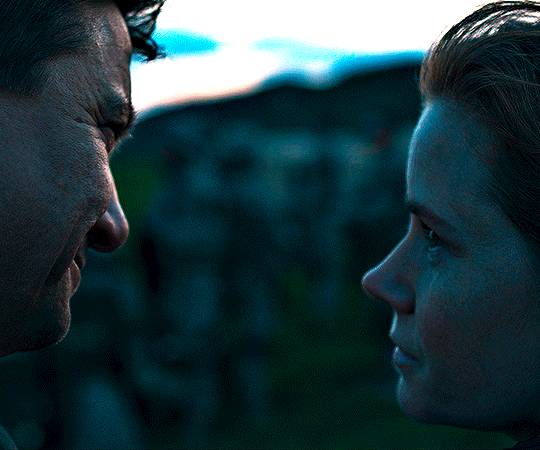
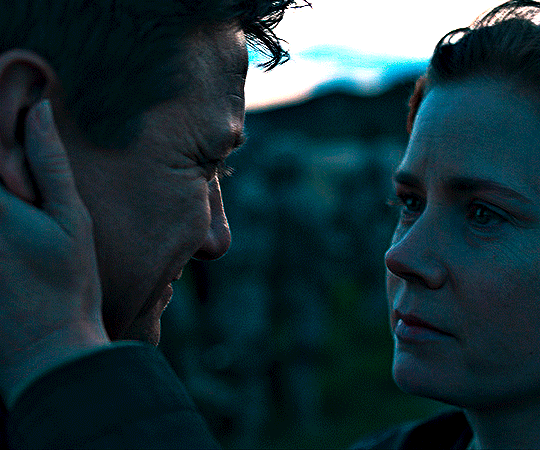
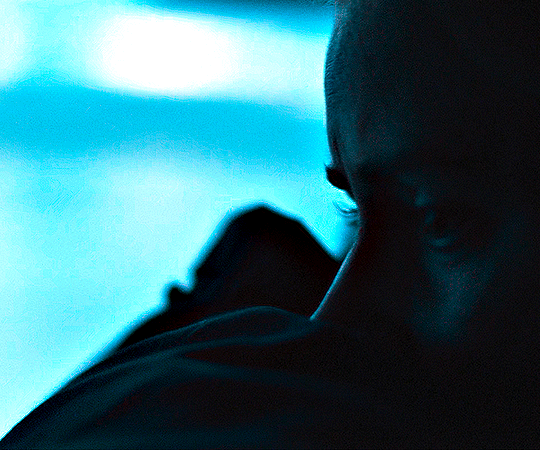

Despite knowing the journey and where it leads, I embrace it. And I welcome every moment of it.
Arrival (2016) dir. Denis Villeneuve
2K notes
·
View notes
Text
@kittenfangirl20 Exactly what I think too! As a "blinker-free" (pardon the term) fan of the Erik/Christine paring, I fully realize that Erik is the kind of individual who skates merrily across a lake of red flags - but at the same time we are presented with a wealth of strong motivations that, at the very least, attempt to say to the reader: "Yes, he is dangerous and damaged, but something, at base, strongly contributed to making him that way." Does it justify the shit he's done? Of course not! But it gives you a way to understand that it's probably the only way he knew how to relate to other people.
These motivations are completely lacking in Raoul. He is rich, he has a solid family behind him that supports him (his sisters and brother), he has known only the positive aspects of life (Poverty? Degradation? Having to actually sweat to earn a living? What are these unfamiliar and absurd concepts?) and he is also presented to us as aesthetically attractive. His being a total jealous and possessive asshole, therefore, has no reason to exist.

It's clear that Erik doesn't represent a completely healthy choice either (psychologists and psychiatrists would have a field day, with him! 😂), but at least he showed that he understood the bullshit he did and - in his twisted way - he "apologized" to Christine, accepting her decision to leave with Raoul without tormenting her anymore - an "act of renunciation" that the Viscount, throughout the novel, proves that he is unable (and unwilling) to perform at all.

Also, honestly, I don't remember ever reading about Raoul apologizing for the bestial way he treated Christine the whole time, not even at the end of everything. This (more than other things) has always led me to accept without too much effort (in fanfiction or even in the ALW sequel) the idea of a drunken or violent Raoul and a "healthier" Erik.
In fact, I don't struggle to believe that with a little work (okay, a lot 😂) Erik can overcome (or at least greatly improve) his flaws until he becomes an acceptable (if not even decent) human being.

But Raoul… In the novel all his "unmotivated unhealthiness" (hatred, possessiveness and jealousy) is based exclusively on mostly unfounded suspicions (a half-conversation - without context - overheard from behind a door, a name made using a certain tone by Christine…) - and he doesn't apologize even when he discovers the truth. It just goes from: "Christine is a whore" to: "I have to free Christine from the man she's attached to in some way, though I don't know which one because I've never listened to her".

Is there really anyone who believes that it would never happen again, once they get married? Given his temper, isn't it more likely that he would view a casual conversation between a man and Christine as yet another proof of a betrayal from her, perhaps by getting drunk or even taking his anger out on her (and we know he's violent too, 'cause - as you rightly pointed up - he threatened of kill a person without even knowing her, and was further capable of shooting, without a second thought, at something/someone he believed was Erik)?

Do we really want to believe that he would be able (as Erik did) to accept Christine's hypothetical decision to leave him - without again thinking that she is incapable of making her own choices?

And the worst thing, in my opinion, is that it is clearly shown (by the way he treats her) that for Raoul Christine she is easily "replaceable".

Terrible to say, but if he really had lost Christine, in the end nothing would have changed for him: in all probability, indeed, he would have found "a replacement" (even if a woman interested only in the comforts he can offer) in the circle of a month. Erik doesn't.

Christine may have been important (personally I don't think so, but still…) to Raoul, but she was the world to Erik.

Yesterday, wandering around here on Tumblr, I found another post about how Eristine fans (like me) prove to have absolutely no understanding of Gaston Leroux's original work.
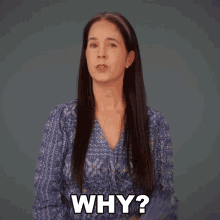
Because we do not see how wonderfully perfect - and more importantly how absolutely healthy as a choice, for Christine - is Raoul de Chagny.
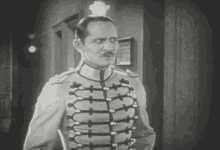
The post then concluded with a clear victorious note establishing how - given the canonicity of Raoul/Christine - this paring was obviously right.
Well, if you will allow me, I would like to respond to that post - by saying that yes, it is quite true.

In fact, everyone knows that:
sneaking - uninvited! - into a person’s dressing room and expecting everyone to leave to be left alone with an unconscious young woman is healthy;
waiting, once - rightly so! - being dismissed from the dressing room by said young woman, in a dark recess, for her to be alone in order to “get back at it” with an unsolicited courtship is healthy;
getting jealous when you hear her talking to a man, to the point - literally! - to becoming enraged and beginning to regard her as a prostitute is healthy;
entering her dressing room in her absence to see who she was daring (!) to talk to is healthy;
following her when she leaves Paris, raging when she apparently rejects your affections and - again! - practically calling her a prostitute when she tries to explain about the Angel of Music is healthy;
escaping through a window so that the innkeeper doesn't see you stalking the young woman in the middle of the night - again without her knowledge - to find out if it is true that she is going to pay her respects at her father’s grave, or if it is just an excuse to meet another man, is healthy;
questioning anyone who knows anything about her and her private life - even though she has clearly expressed her intention to break off your relationship (of friendship, let’s clarify! There is no engagement, secret or otherwise) - and even going so far as to show up at her home - again, uninvited! - to “put the screws” on his elderly and ailing foster mother, suggesting to her that the said young woman is (guess what? Bravo!) almost a prostitute just because she has not yet fallen at your feet, smitten in love with a spoiled child, is healthy;
“ambushing” the carriage in which the young woman travels, so that you can confront face to face the man with whom she dared to cheat on you (?!?), ending up for the umpteenth time considering her a prostitute “who led you on” (again, what?!?) is healthy;
considering her a saint or a whore depending on the time of day is healthy;
offending and humiliating her (accusing her, as is now ritual, of being the worst of whores) when she tries to explain to you, at the masquerade ball, what has happened to her and is still happening to her is healthy;
slipping - once again! - uninvited into her dressing room, spying on her as she writes a private letter, and even managing to rage when she seems to show pity for someone who is not you is healthy;
showing up - uninvited of course - at the young woman’s home, accusing her of not being herself, of being naive and a person completely incapable of judging the people around her, trying to get her to promise that she will never go out without you again, even managing to become enraged when she refuses to reveal the name of the “man who had the audacity to put a gold ring on her finger,” and her response to the proposal that certainly came with the ring is healthy;
taking seriously a fake engagement (which has very little secret about it, since the “third wheel in the triangle” himself urges the young woman to engage in it), and firmly claiming to turn it into a marriage - despite the fact that over and over and over again the young woman has told you that she has no intention of marrying you, and that yours is a game - is healthy…

Just tell me: should I continue? Because I don’t know how you feel about it, but it never seemed to me that Raoul was so much “the best choice” at the end of the day…
(To be clear: Erik has not a few problems and flaws, but at least he was honest and never claimed to be a "healthy choice'... and no honest Eristine fan would ever say that).

As for the "canonical = perfect" argument... I would like to remind you that Hades/Persephone is also canonical, yet everything is but a happy couple riding off into the sunset, so...
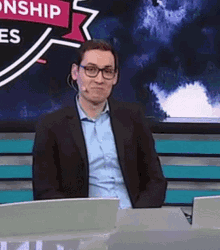
(P.S. I can no longer find the original post, so I would like to apologize to @textsfromthefifthbasement for using her screenshot).
(P.S. part 2: Thanks to @brendadaaedestler for pointing out how I needed to... "express out loud" this analysis of mine of the real 'healthiness' of Raoul de Chagny's character.)
#Erik#erik x christine#raoul de changy#raoul x christine#eristine#raoulstine#christine daae#anti raoul de chagny#anti raoulstine#Poto#phantom of the opera#gaston leroux#Both are toxic#but one more than the other#le fantome de l'opera#love never dies
173 notes
·
View notes